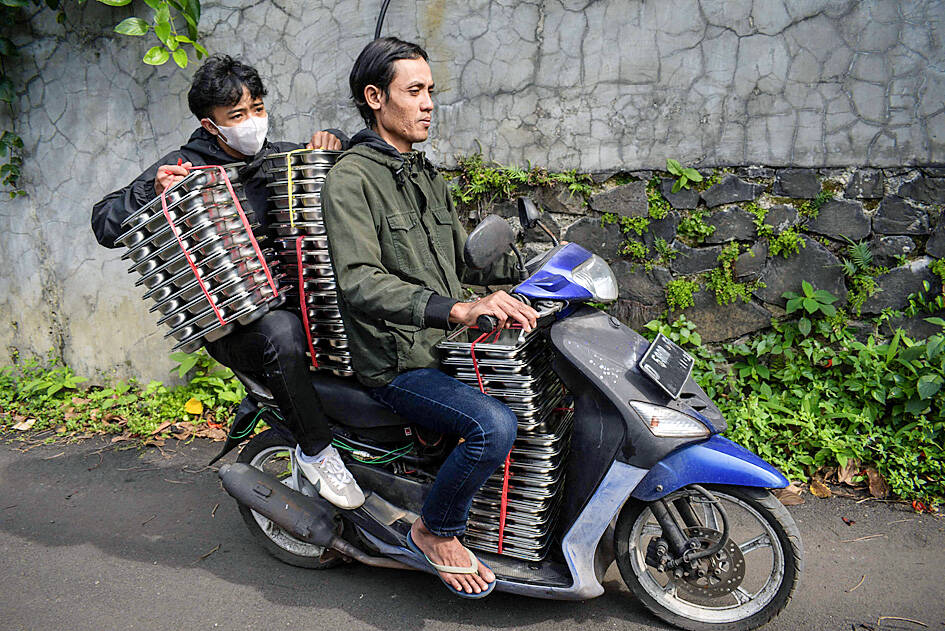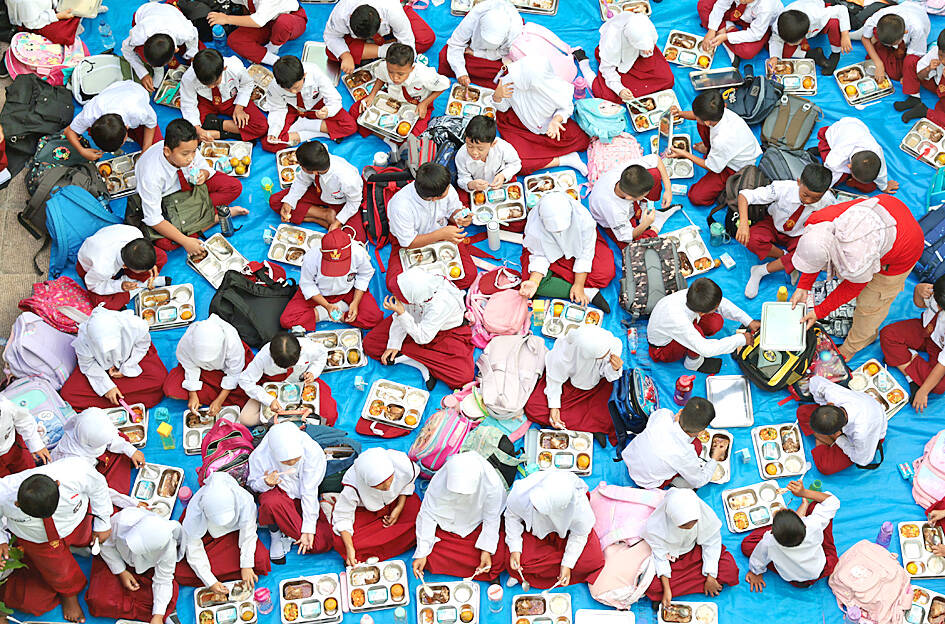Indonesia yesterday launched an ambitious US$4.3 billion free-meal program to combat stunted growth due to malnutrition, a key election promise of President Prabowo Subianto.
Prabowo has pledged to provide nutritious meals free to tens of millions of schoolchildren and pregnant women, saying it would improve their quality of life and boost economic growth.
“This is historic for Indonesia for the first time conducting a nationwide nutrition program for toddlers, students, pregnant and breastfeeding mothers,” presidential spokesman Hasan Nasbi said late on Sunday.

Photo: AFP
At least 190 kitchens run by third-party catering services opened nationwide, including some run by military bases, and were busy preparing meals from midnight before distributing them to schoolchildren and pregnant women.
Second-grader Khalifa Eldrian beamed after finishing his free lunch of rice, chicken, vegetables and a banana at an elementary school in East Jakarta.
“I’m happy because the food was delicious... I can concentrate more when studying,” he said.

Photo: EPA-EFE
The government has allocated 10,000 rupiah (US$0.62) per meal and has a budget of 71 trillion rupiah for the 2025 fiscal year. It is set to deliver meals to almost 83 million people by 2029.
Stunting affects 21.5 percent of children in the archipelago of about 282 million people. The nation aims to reduce the rate to 5 percent by 2045.
Staff in a kitchen in Bogor, West Java, had worked tirelessly since just after midnight.
“We serve different menus every day, it has to be different so children won’t get bored,” staff member Ayu Pertiwi said.
Ayu said they were serving fairly nutritious meals such as eggs and fish even with the limited budget, although meat would likely only be served twice a month.
“We can still create various menus, but the options are limited. For us, the most important thing is the meal is nutritious,” she said.
The program was met with skepticism from experts when it was first announced during last year’s election campaign.
Tan Shot Yen, a Jakarta-based nutritionist and doctor, said trials late last year were mostly conducted in urban centers and assessments were not made available to the public.
She said the government needed transparent monitoring and robust food safety management to prevent hazards and the inclusion of unhealthy processed products, such as instant noodles and sausages.
“I hope this program is not just a temporary charitable effort to fulfill political promises,” she said. “To continue it for the long term, the government should focus not only on funding, but also on empowering communities so [recipients] are not simply reliant on free meals once a day while struggling to find food for the other two meals,” she said.
Analysts have said the scheme is not sustainable in the long term.
“I am quite pessimistic if everything is shouldered by the central government. Economically, it’s not sustainable,” said Aditya Alta, a public policy analyst from the Center for Indonesian Policy Studies think tank.
“Stunting is a multidimensional issue and addressing it through just one approach is insufficient,” he said.

PARLIAMENT CHAOS: Police forcibly removed Brazilian Deputy Glauber Braga after he called the legislation part of a ‘coup offensive’ and occupied the speaker’s chair Brazil’s lower house of Congress early yesterday approved a bill that could slash former Brazilian president Jair Bolsonaro’s prison sentence for plotting a coup, after efforts by a lawmaker to disrupt the proceedings sparked chaos in parliament. Bolsonaro has been serving a 27-year term since last month after his conviction for a scheme to stop Brazilian President Luiz Inacio Lula da Silva from taking office after the 2022 election. Lawmakers had been discussing a bill that would significantly reduce sentences for several crimes, including attempting a coup d’etat — opening up the prospect that Bolsonaro, 70, could have his sentence cut to

China yesterday held a low-key memorial ceremony for the 1937 Nanjing Massacre, with Chinese President Xi Jinping (習近平) not attending, despite a diplomatic crisis between Beijing and Tokyo over Taiwan. Beijing has raged at Tokyo since Japanese Prime Minister Sanae Takaichi last month said that a hypothetical Chinese attack on Taiwan could trigger a military response from Japan. China and Japan have long sparred over their painful history. China consistently reminds its people of the 1937 Nanjing Massacre, in which it says Japanese troops killed 300,000 people in what was then its capital. A post-World War II Allied tribunal put the death toll

‘UNWAVERING ALLIANCE’: The US Department of State said that China’s actions during military drills with Russia were not conducive to regional peace and stability The US on Tuesday criticized China over alleged radar deployments against Japanese military aircraft during a training exercise last week, while Tokyo and Seoul yesterday scrambled jets after Chinese and Russian military aircraft conducted joint patrols near the two countries. The incidents came after Japanese Prime Minister Sanae Takaichi triggered a dispute with Beijing last month with her remarks on how Tokyo might react to a hypothetical Chinese attack on Taiwan. “China’s actions are not conducive to regional peace and stability,” a US Department of State spokesperson said late on Tuesday, referring to the radar incident. “The US-Japan alliance is stronger and more

FALLEN: The nine soldiers who were killed while carrying out combat and engineering tasks in Russia were given the title of Hero of the Democratic People’s Republic of Korea North Korean leader Kim Jong-un attended a welcoming ceremony for an army engineering unit that had returned home after carrying out duties in Russia, North Korean state media KCNA reported on Saturday. In a speech carried by KCNA, Kim praised officers and soldiers of the 528th Regiment of Engineers of the Korean People’s Army (KPA) for “heroic” conduct and “mass heroism” in fulfilling orders issued by the ruling Workers’ Party of Korea during a 120-day overseas deployment. Video footage released by North Korea showed uniformed soldiers disembarking from an aircraft, Kim hugging a soldier seated in a wheelchair, and soldiers and officials